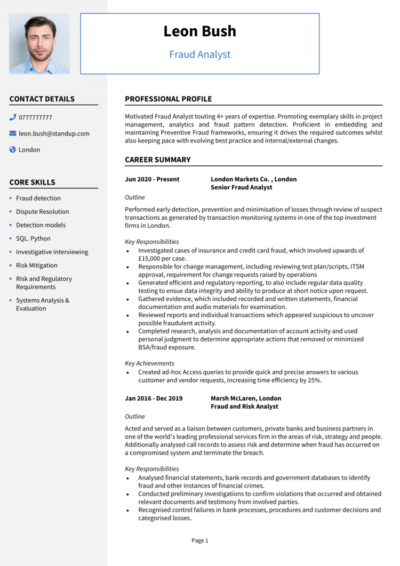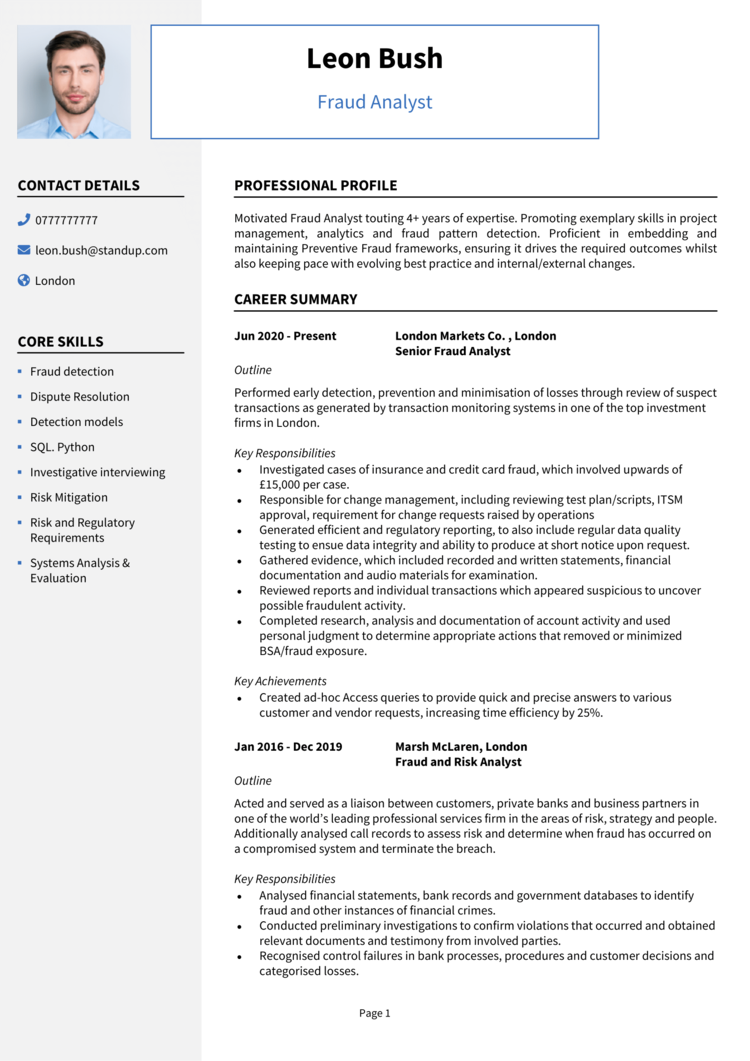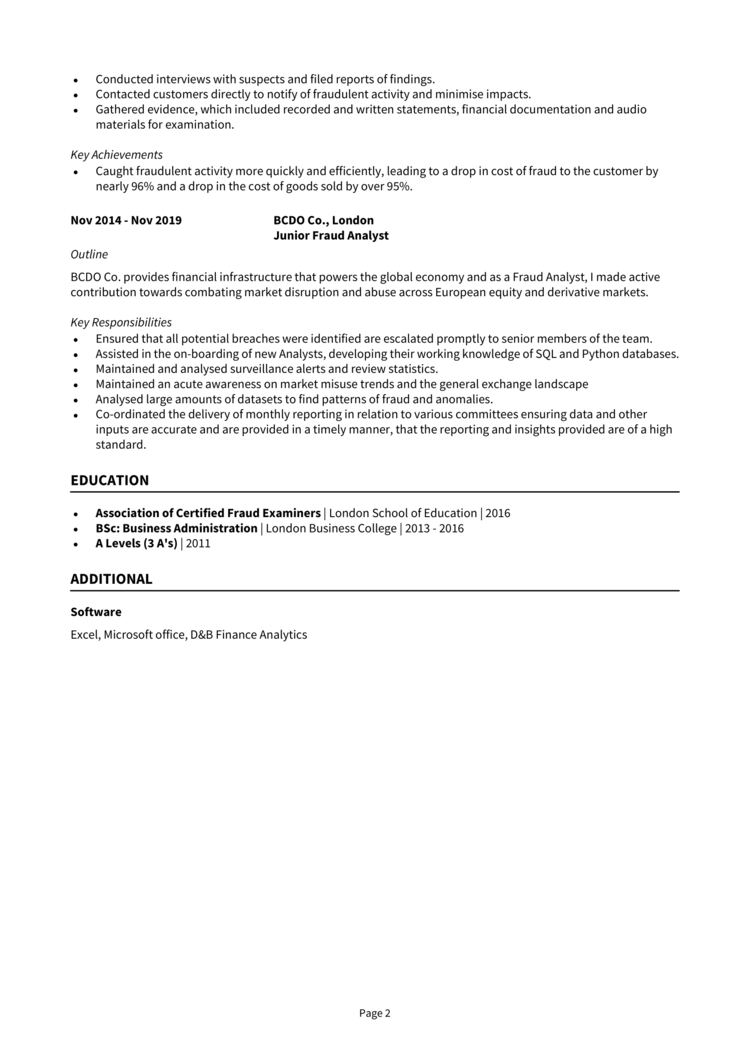Can you spot even the smallest error, discrepancy or suspicious activity on a customer account?
Then you could be a huge asset to any company hoping to stop the growing wave of fraudsters out there.
But first, you need to prove to the recruiter that you aren’t a fraud with a strong CV. We can help you to create an impressive application using our fraud analyst CV example and step-by-step guide below.
|
Fraud Analyst CV example
Use this CV example as a guide to formatting and structuring your Fraud Analyst CV, so that busy recruiters can easily digest your information and determine your suitability for the role.
It also provides some insight into the key skills, experience and qualifications you need to highlight.


Fraud Analyst CV layout and format
In a highly competitive job market, recruiters and employers are often inundated with applications. If they can’t find what they’re looking for in your CV quickly, they may skip past your application and move on to the next one in their inbox
So, it’s crucial to structure and format your CV in a way that enables them to find your essential details with ease, even if they’re pressed for time.
Tips for formatting your Fraud Analyst CV
- Length: If you want to hold the reader’s attention and ensure your CV isn’t yawn-worthy, it’s best to stick to two sides of A4 or less. This is more than enough room to highlight why you’re a good match for the role – anything more can quickly become tedious!
- Readability: To help busy recruiters scan through your CV, make sure your section headings stand out – bold or coloured text works well. Additionally, try to use bullet points wherever you can, as they’re far easier to skim through than huge paragraphs. Lastly, don’t be afraid of white space on your CV – a little breathing space is great for readability.
- Design: While it’s okay to add your own spin to your CV, avoid overdoing the design. If you go for something elaborate, you might end up frustrating recruiters who, above anything, value simplicity and clarity.
- Photos: Don’t add profile photos to your CV unless you work in an industry or region which prefers to see them. Most employers in the UK will not need to see one.
Quick tip: Creating a professional CV style can be difficult and time-consuming when using Microsoft Word or Google Docs. To create a winning CV quickly, try our quick-and-easy CV Builder and use one of their eye-catching professional CV templates.
CV structure
To make it easy for busy recruiters and hiring managers to digest your CV, divide the content into several key sections when writing it:
- Contact details: Always list your contact details at the very top to avoid them being missed.
- Profile: Start with an introductory paragraph that catches recruiters’ attention and summarises your offerings.
- Work experience/career history: List your relevant work experience in reverse chronological order, starting with your current position.
- Education: Provide a concise summary of your education and qualifications.
- Interests and hobbies: You can include an optional section to showcase any hobbies that demonstrate transferable skills.
Now you understand the basic layout of a CV, here’s what you should include in each section of yours.
Contact Details
Write your contact details in the top corner of your CV, so that they’re easy to find but don’t take up too much space.
You only need to list your basic details, such as:
- Mobile number
- Email address
- Location – Don’t list your full address. Your town or city, such as ‘Norwich’ or ‘Coventry’ is perfect.
- LinkedIn profile or portfolio URL – Remember to update these before listing them on an application.
Fraud Analyst CV Profile
Your CV profile (or personal statement, if you’re an entry-level applicant) provides a brief overview of your skills, abilities and suitability for a position.
It’s ideal for busy recruiters and hiring managers, who don’t want to waste time reading unsuitable applications.
Think of it as your personal sales pitch. You’ve got just a few lines to sell yourself and prove you’re a great match for the job – make it count!
CV profile writing tips:
- Make it short and sharp: Recruiters have piles of CVs to read through and limited time to dedicate to each, so it pays to showcase your abilities in as few words as possible. 3-4 lines is ideal.
- Tailor it: No matter how much time you put into your CV profile, it won’t impress if it’s irrelevant to the role you’re applying for. Before you start writing, make a list of the skills, knowledge and experience your target employer is looking for. Then, make sure to mention them in your CV profile and throughout the rest of your application.
- Don’t add an objective: Career goals and objectives are best suited to your cover letter, so don’t waste space with them in your CV profile.
- Avoid generic phrases: If there’s one thing that’ll annoy a recruiter, it’s a clichè-packed CV. Focus on showcasing your hard skills, experience and the results you’ve gained in previous roles, which will impress recruiters far more.
Example CV profile for Fraud Analyst
What to include in your Fraud Analyst CV profile?
- Experience overview: To give employers an idea of your capabilities, show them your track record by giving an overview of the types of companies you have worked for in the past and the roles you have carried out for previous employers – but keep it high level and save the details for your experience section.
- Targeted skills: Highlight your skills which are most relevant to Fraud Analyst jobs, to ensure that recruiters see your most in-demand skills as soon as they open your CV.
- Key qualifications: Be sure to outline your relevant Fraud Analyst qualifications, so that anyone reading the CV can instantly see you are qualified for the jobs you are applying to.
Quick tip: If you are finding it difficult to write an attention-grabbing CV profile, choose from hundreds of pre-written profiles across all industries, and add one to your CV with one click in our quick-and-easy CV Builder. All profiles are written by recruitment experts and easily tailored to suit your unique skillset.
Core skills section
Create a core skills section underneath your profile to spotlight your most in-demand skills and grab the attention of readers.
This section should feature 2-3 columns of bullet points that emphasise your applicable skills for your target jobs. Before constructing this section, review the job description and compile a list of any specific skills, specialisms, or knowledge required.
Important skills for your Fraud Analyst CV
Fraud Detection and Prevention – Identifying potentially fraudulent activities and developing measures to prevent them.
Data Analysis – Analysing large sets of data to identify patterns, trends, and anomalies that could indicate fraudulent activity.
Risk Assessment – Assessing the level of risk and impact of fraud on an organisation and developing strategies to mitigate these risks.
Investigation Management – Utilising investigative techniques to gather and analyse evidence, including interviewing, research, and document review.
Fraud Law – Utilising knowledge of UK laws and regulations related to fraud, including criminal and civil law, data protection, and money laundering.
Fraud Prevention Technologies – Utilising anti-fraud technologies, such as data analytics, fraud detection software, and artificial intelligence.
Stakeholder Communication – Conveying findings, recommendations, and progress to senior management and other stakeholders.
Cross-functional Collaboration – Working closely with other teams, including legal, compliance, IT, and risk management, to develop and implement fraud prevention measures.
Case Management – Prioritising tasks, meeting deadlines, and working on multiple cases simultaneously.
Quick tip: Our quick-and-easy CV Builder has thousands of in-demand skills for all industries and professions, that can be added to your CV in seconds – This will save you time and ensure you get noticed by recruiters.


Work experience section
Recruiters will be itching to know more about your relevant experience by now.
Kick-start this section with your most recent (or current) position, and work your way backwards through your history.
You can include voluntary and freelance work, too – as long as you’re honest about the nature of the work.
Structuring each job
Lengthy, unbroken chunks of text is a recruiters worst nightmare, but your work experience section can easily end up looking like that if you are not careful.
To avoid this, use my tried-and-tested 3-step structure, as illustrated below:
Outline
Start with a 1-2 sentence summary of your role as a whole, detailing what the goal of your position was, who you reported to or managed, and the type of organisation you worked for.
Key responsibilities
Next up, you should write a short list of your day-to-day duties within the job.
Recruiters are most interested in your sector-specific skills and knowledge, so highlight these wherever possible.
Key achievements
Round up each role by listing 1-3 key achievements, accomplishments or results.
Wherever possible, quantify them using hard facts and figures, as this really helps to prove your value.
Sample job description for Fraud Analyst CV
Outline
Performed early detection, prevention, and minimisation of losses through review of suspect transactions as generated by transaction monitoring systems in one of the top investment firms in London.
Key Responsibilities
- Investigated cases of insurance and credit card fraud, which involved upwards of £15,000 per case.
- Responsible for change management, including reviewing test plan/scripts, ITSM approval, requirement for change requests raised by operations.
- Generated efficient and regulatory reporting, to also include regular data quality testing to ensue data integrity and ability to produce at short notice upon request.
- Gathered evidence, which included recorded and written statements, financial documentation, and audio materials for examination.
Quick tip: Create impressive job descriptions easily in our quick-and-easy CV Builder by adding pre-written job phrases for every industry and career stage.
Education and qualifications
At the bottom of your CV is your full education section. You can list your formal academic qualifications, such as:
- Degree
- GCSE’s
- A levels
As well as any specific Fraud Analyst qualifications that are essential to the jobs you are applying for. Note down the name of the qualification, the organisation at which you studied, and the date of completion.
Hobbies and interests
Although this is an optional section, it can be useful if your hobbies and interests will add further depth to your CV.
Interests which are related to the sector you are applying to, or which show transferable skills like leadership or teamwork, can worth listing.
On the other hand, generic hobbies like “going out with friends” won’t add any value to your application, so are best left off your CV.


A strong, compelling CV is essential to get noticed and land interviews with the best employers.
To ensure your CV stands out from the competition, make sure to tailor it to your target role and pack it with sector-specific skills and results.
Remember to triple-check for spelling and grammar errors before hitting send.
Good luck with the job search!











